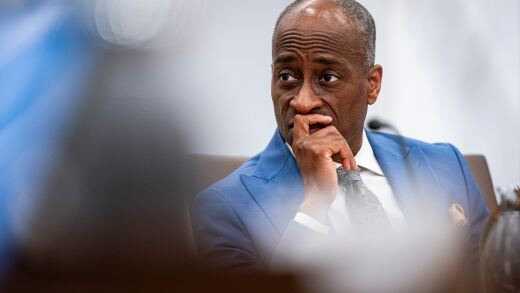-
The Treasury will phase out the use of paper checks for most government payments in about six months. The Trump administration says the move will improve efficiency and reduce the cost of payment processing.
March 26 -
Dave Cunningham, senior case manager for Alvaka shares insights on ransomware attacks, how to avoid them and what victims should do if they are targeted.
March 26 -
The banking industry's march to ISO 20022 compliance by a November deadline has been sluggish, but the messaging organization isn't budging.
March 26 -
The law would have expanded the state's 12% interest rate cap in a manner that would have effectively banned fintech lending in the state.
March 25 -
The largest U.S. banks are facing shareholder votes on a number of politically charged issues — some backed by conservative groups and others championed by organizations with a more progressive bent.
March 25 -
Wall Street veteran Frank Bisignano pledged at a Senate Finance Committee hearing that he doesn't plan to privatize Social Security.
March 25 -
The bank has added Affirm as an option, after adding the fintech's rival Klarna to its merchant network in February.
March 25
Prior to the arrangement, gig workers were paid via prepaid cards. The new method is more secure and easier for users to manage.
Growing loans was a tall order in 2024, but banks that could do just that were able to outperform their peers.
Among banks with between $10 billion and $50 billion of assets, those that targeted narrow lending markets rose to the top.
Seven of the 20 top-performing banks with $2 billion to $10 billion of assets last year were based in Texas. But it's not about being bigger.
Federal Reserve Vice Chair Philip Jefferson said in a speech Wednesday that elevated tariffs will likely lead to inflation, but time will tell how impactful that spike in prices might be.
The benefits of open banking are obvious and significant for consumers — especially those underserved by the current marketplace. Bankers and regulators should work to speed up its implementation.
Federal Reserve Vice Chair Philip Jefferson said in a speech Wednesday that elevated tariffs will likely lead to inflation, but time will tell how impactful that spike in prices might be.
The benefits of open banking are obvious and significant for consumers — especially those underserved by the current marketplace. Bankers and regulators should work to speed up its implementation.
Bankers are concerned about stablecoins gaining traction due to the passage of the GENIUS Act, and also continue to sound the alarm about the failure to resolve check fraud disputes, according to the latest quarterly survey from IntraFi.
Pulaski Savings Bank's failure will cost the FDIC's Deposit Insurance Fund 57.6% of its total assets.
The CEO of First Northwest Bancorp is promising to fight a lawsuit claiming the lender helped a client perpetrate a Ponzi scheme that bilked a hedge fund out of more than $100 million.
Most Influential Women in Payments honorees say the dramatic expansion in technology presents new opportunities and challenges as employers evolve away from traditional business models.
Honorees from American Banker's Most Influential Women in Payments discuss spotting tangible uses for innovation, rather than buying into hype.
Each year, American Banker recognizes the women who are advancing the payments industry in banking, retail, acquiring, processing and more.

-
John Buran shares how his New York bank and its small business customers are faring with tariff uncertainty — and how some have quickly changed suppliers and modified business plans — in the latest American Banker podcast.
July 15 -
Staking activities and stablecoins are two of the possible ways banks could have a role in decentralized finance, said Margaret Butler, head of the financial services practice at the law firm BakerHostetler and Kristiane Koontz, director of Treasury Services and Payments at Zions Bank, in interviews recorded at the Digital Banking Conference in June.
July 1
-
The Trump administration wants the Small Business Administration to shrink its workforce by 43%. At the same time, the agency is being asked to start managing the federal government's student loan portfolio.
March 24 -
Officials in the Trump administration have floated the idea of changing how the government measures economic growth. Economists say the shift would create new expenses for banks.
March 24 -
Trade groups representing banks and utilities urged lawmakers to reauthorize the CISA law before it expires in September.
March 24 -
The fintech, which specializes in low or no fee banking and early access to paychecks, is now offering three-month installment loans.
March 24 -
The Justice Department has asked the high court to intervene and halt reinstatements of federal employees who were fired by the Office of Personnel Management.
March 24



























